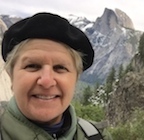- About Archives
- About SAA
- Careers
- Education
- Publications
- Advocacy
- Membership

Professional Experience: Consultant, 2002–present. Associate University Librarian, University of California, Santa Cruz (UCSC) Digital Library and Assessment, 2014–2015 and Collections and Library Information Services, 2012–2014. Project Manager, Grateful Dead Archive Online, UCSC, 2010–2012. Director, Digital Library Program, UC San Diego, 2008–2010. Director, Online Archive of California, California Digital Library, 2000–2008. Head, Archives and Special Collections, UC San Francisco, 1995–2000. Archivist, SLAC National Accelerator Laboratory, 1990–1995. Archives & Manuscript Specialist, Stanford University Libraries, 1985–1989. Photograph Cataloger and Reference Specialist, National Maritime Historic Park, 1982–1985.
Education: MA, American History, San Francisco State University, 1997. MLIS, University of California, Berkeley, 1990. BA, Art Studio, University of California, Davis, 1981.
Professional Activities: Society of American Archivists: Member, 1986–present; Appointments Committee Member 2015–2016, Annual Meeting Program Committee Co-chair 2013, Annual Meeting Program Committee Member 1996, SciTech HealthCare Roundtable (Co-chair 1996–1999, Steering Committee 1990–2000, Newsletter Editor 1990–1993). Society of California Archivists: Member, 1986–present. Vice-President/President 2000–2003, Board Member, 1997–2003, Annual Meeting Program Committee 2009, Co-chair Outreach Committee 1995–2000, Member Western Archives Institute (WAI) Task Force 2005, Co-chair Western Archives Institute Strategic Planning Task Force, 1997–1998 and Co-chair WAI Curriculum Review Task Force, 1998–1999; Elections Committee Chair, 1989–1990, 1993–1995, Education Committee, Mink Scholarship Chair, 1989–1992, Awards Committee Chair, 1992–1993. Gay and Lesbian Historical Society of Northern California (GLHS): Board Member & Co-chair of the Archives Committee, 1994–1996. Other: NEH grant review board member, 1998–2010; NHPRC grant reviewer, 2005–2010.
Selected Publications: “Building the Grateful Dead Archive Online: A Technical View,” co-authored with Kevin Clarke, Midwest Archives Conference Newsletter, 2012; Archives in Digital Libraries, co-edited with Bill Landis, Binghamton, NY: Haworth Press, 2007, simultaneously published in Journal of Archival Organization (JAO) 4:1/2 (2007); “California Cultures: Implementing a Model for Virtual Collections” co-authored with Genie Guerard, Archives in Digital Libraries, and JAO 4:1/2 (2007); “Building Digital Collections at the OAC: Current Strategies with a View to Future Uses,” JAO, 1:1 (2002);“Archives Case Study: Lighting Up the Internet: The Brown and Williamson Tobacco Collection,” co-authored with Susan Storch. Archives and the Public Good: Accountability and Records in Modern Society, edited by Richard J. Cox and David A. Wallace, 2002; "Cigarette Papers: Issues in Publishing Materials in Multiple Formats," co-authored with Karen Butter & John Kunze. D-Lib Magazine, November 1996; "The Promise of Research and Development in Physics and Medicine: The Quest for SPEAR and Living with AIDS," California History, 75:1 (1996).
Awards: Digital Pioneers: Conquering New Frontiers in Archives, Libraries and Museums, 2011; Society of American Archivists' 2005 Coker Award for Descriptive Finding Aid Systems presented to the Online Archive of California (OAC); California Heritage Preservation Commission 2004 Archivist of Excellence Award for leadership in developing the OAC.
* * *
Question posed by Nominating Committee:
SAA is a member-governed organization that is composed of dozens of constituent groups with a variety of viewpoints. In recent years, SAA’s governance structure has strived to be more transparent and responsive in addressing member concerns. If elected, how would you help insure that the Council continues on this path and represents the broad interests of our diverse profession in a transparent manner?
Candidate's Response:
Archives and archivists have the agency to hold the powerful accountable, empower the writing of history, clarify memory, and give voice to the powerless. Digital tools and social-networking communities are positively impacting how power is realized by the communities, organizations and individuals we document and within our own profession. As with every mile I pedaled of the 545 miles of the 2015 AIDS Lifecycle, each SAA member’s voice brings value and significance to our professional community as individuals and in aggregate. It is critical the SAA governance structure hear member voices and respond to community needs. Toward this end, I hope to bring my voice to Council’s ongoing effort to be more transparent and responsive in addressing member concerns. A few possible approaches include: open-forum debate, for example, when considering strategic initiatives or policy changes, Council establishes a public online forum in which the issue and Council’s proposed resolution and solution is presented (majority/minority Council opinions on Council can also be expressed) and discussion opened for SAA members' opinions; providing sections and roundtables with a clear path to add items to Council discussion agendas, yielding a transparent proposed agenda facilitating membership discussion; and strengthening ties with regional archival organizations. For example, SAA Council members often attend regional annual meetings where they could informally solicit opinions in which SAA might contribute national assistance to local concerns and consider ways the SAA Foundation can support archival initiatives and research.
Slate of Candidates |
The Nominating Committee has slated the following SAA members as candidates for office in the 2016 election: